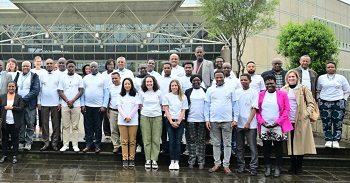A group of experts attending the 46th UN Framework Convention on Climate Change (UNFCC) meeting for Least Developed Countries concluded with a call to accelerate efforts on adaptation and resilience.
Held from 19-22 August in Addis Ababa, The Least Developed Countries Expert Group (LEG) lauded the host country, Ethiopia, for its Green Legacy Initiative, which has embedded reforestation and landscape restoration in its climate change and ecosystems protection plan.
The meeting was organized by the UNFCCC secretariat and Ethiopia’s Ministry of Planning in partnership with the African Climate Policy Centre of the United Nations Economic Commission for Africa. Established under the UNFCCC in 2001, the primary responsibility of the Experts Group is to assist the least developed countries (LDCs) to address climate change with a focus on effective means of adapting to the adverse impacts of climate change.
Top on the agenda of the group’s deliberations are ways to assist all the LDCs to have in place their national adaptation plans (NAPs), and pathways to access funding and other support to implement agreed adaptation priorities. Additionally, the group meets to update the technical guidelines for the preparation and implementation of the NAPs based on emerging developments in the global policy landscape, as well as in science, and technology.
Since the process to formulate and implement NAPs was established in 2010, along with the subsequent technical guidance and financial arrangements, only 22 of the 45 LDCs have successfully produced a NAP.
“This lack of progress is concerning, given that all countries are expected to have their NAPs in place by 2025 and to show significant progress in implementation by 2030. The Least Developed Countries Expert Group continues to provide technical guidance and support to the LDCs, which includes the development of guidelines, facilitating access to climate data and information, and facilitating access to necessary funding,” said Mr. Gabriel Kpaka, Chair of the LEG.
For his part, Mr. Evans Njewa, Chair of the LDC Group under the UNFCCC said: “The steadfast support provided by the LEG is critical for LDCs to adapt and foster climate change resilience.”
The meeting noted that weather and climate extremes, such as floods, droughts, and heatwaves and the scale of their impacts continue to increase across the globe. In July and August 2024, heavy rainfall caused severe flooding and landslides in Southern Ethiopia, an area that was already hit by floods in May 2024, leading to increased loss of life, displacement and damages to livelihoods.
And many LDCs are diverting significant proportions of their budgets unplanned to response to extreme climate events. Launched in June 2019, the Government of Ethiopia’s Green Legacy Initiative has undertaken concrete actions to respond to the ever-increasing impacts of climate change.
Seyoum Mekonen, Ethiopia’s Minister of Planning and Development elaborated on the government’s ambitious goal of planting 20 billion seedlings across the country and said by the fourth year, Ethiopia had surpassed this target, planting 25 billion seedlings, thanks to the mobilization of over 20 million citizens nationwide.
The meeting learnt that the initiative has also contributed to job creation, with over 767,000 jobs generated, particularly benefiting women and youth. With more than 120,000 nurseries established across the country, the program continues to thrive. In 2023 alone, 5 million indigenous seedlings were planted, and plans are underway to plant an additional 600 million seedlings in 2024.
“The government is ready to collaborate with neighboring countries, sharing its experiences in our very successful Green Legacy Initiative and encouraging the expansion and enhancement of similar climate-resilient programs,” said Minister Seyoum Mekonen.
The LDCs face unique and severe challenges in adapting to climate change due to their limited resources, fragile economies, and heightened vulnerability to climate impacts. These nations often lack the financial means, technological capacity, and institutional frameworks necessary to implement effective adaptation strategies, making international and regional support systems critical to their survival and development.
Existing support mechanisms, including financial support, technology transfer, and capacity-building initiatives, are essential but often insufficient, burdened by complex procedures and slow disbursement processes.
To address these gaps, experts stressed that there is an urgent need to revamp the current procedures and modalities, making them more accessible, responsive, and tailored to the specific needs of LDCs. Strengthening these support systems is crucial not only for enabling these countries to cope with climate change but also for ensuring global climate resilience and equity.
“Indeed, efforts are being made to transform the NAPs to attract the necessary financing for implementing adaptation actions by the LDCs, along with transforming how funding is provided to the LDCs, to address the persistent obstacles and challenges they face in accessing financing that is available’’ said Paul Desanker, UNFCCC secretariat.
“It is important that LDCs are supported with the tools and capacities to build resilience and ensure that investments in key sectors are climate-proofed to deliver in both today’s and tomorrow’s climate. The UN-wide Opportunities and Issues Based Coalition 4 on fostering climate action and resilience – co-convened by the ECA, UNEP, FAO and UNDP – provides a platform for supporting LDCs with such capacities and tools” said Linus Mofor, Senior Environmental Affairs Officer at the African Climate Policy Centre of the ECA.
The meeting was also attended by the representatives of various organizations, including various UN entities, that actively provide or facilitate access to technical and financial support to the LDCs.

